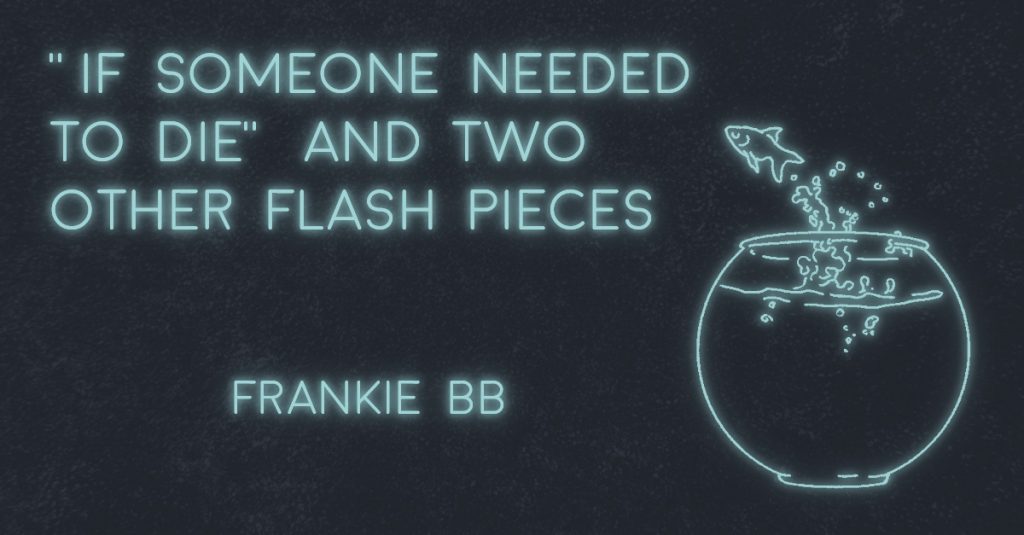

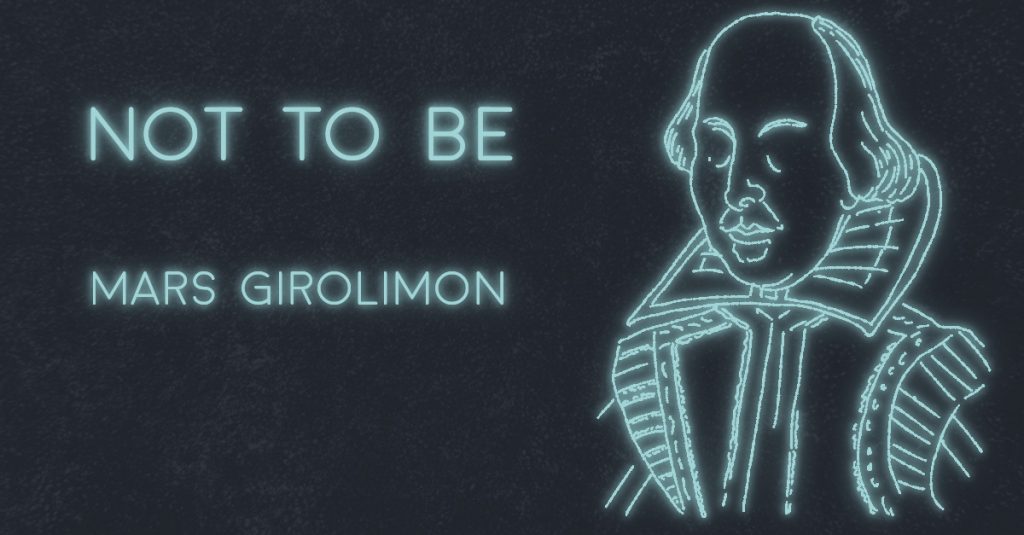
NOT TO BE by Mars Girolimon
I’m in class reading Hamlet and contemplating suicide on a cliffside. Reciting poetic verses about family curses and hiding behind a curtain with a knife. My phone buzzes, and I lean forward to read something out of a Shakespearean tragedy. She killed someone. The words glow like the flame of a lit match and I spring from my desk chair, repelled by their heat. Faces swivel toward me, judgement radiating from their eyes. I’m an injured animal at the center of a swarm about to be mauled by my own pack. My heartbeat radiates in my ears: glove to a punching bag or knife to a chest. I ask, “Can I be excused?” But don’t wait for an answer. I grab my cell phone and stumble out the door. Knuckles white to match my ghostly face, I can’t help but imagine a skull in my palm instead.
I knew her.
In the privacy of a public bathroom, I perch with knees to my chest, balancing like an ape on the branch of a porcelain tree as I read. Police arrived at her room, responding to concerned calls about violent-sounding screams. She opened the door, bloodied hands shaking and outstretched in surrender. Behind her, a scene of crimson and rouge, organ and flesh. “I killed him,” she said. “Arrest me.”
Memories flood the folds of my brain. Every time I told her I loved her. How she tucked my hair behind my ear. Every time she mentioned church or raised her voice. Moments I should have known or couldn’t have known all circle me like vultures. Their screeching pierces like a blade. I can almost see her standing over me, electric with adrenaline pumping through her veins and a dagger clasped between her hands. Are my ears ringing or is that another text? I close my eyes and ask Shakespeare what comes next.
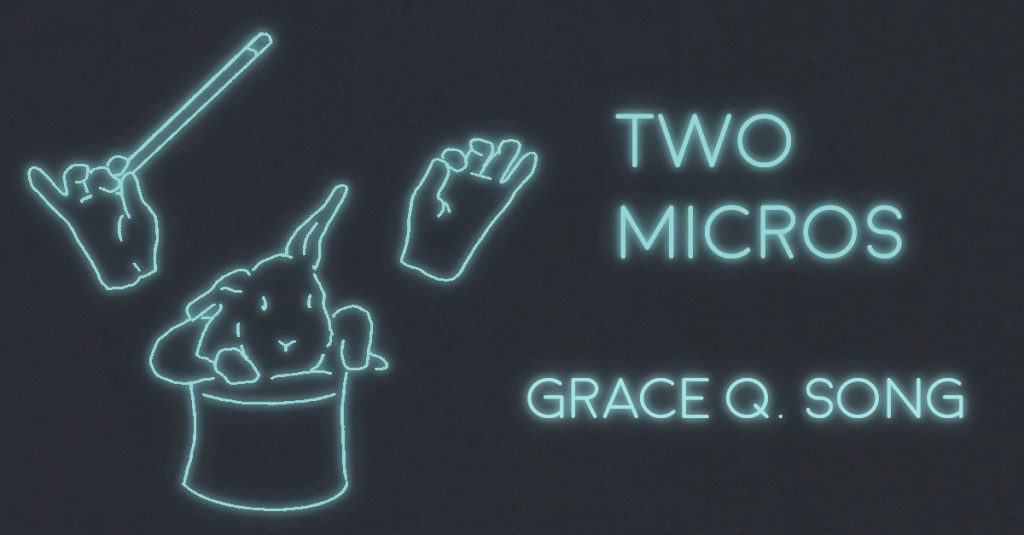
TWO MICROS by Grace Q. Song
MAGICIAN’S HAT
You find an upside-down magician’s hat on a table. It’s made of velvet, smooth as moonlight between your fingers, and a stripe, broad and white, wraps around its base. No one’s around. The first thing you pull out is a wand. Next, a deck of fresh cards. Pigeons and rabbits who disappear into the dark corners of the room. These are ordinary things you’d expect to find in a magician’s hat, nothing too surprising. So, you keep pulling and pulling, magic trick after magic trick, until things finally begin. The twenty-fifth item is a red Starburst, followed by a hair tie, then a roll of peel-and-stick wallpaper, and a pack of tissues. The forty-third item is a grocery receipt, the one hundred ninety-ninth: a crumpled permission slip for an eighth-grade field trip, the five hundred seventy-sixth: a birthday card from Dave. Money comes pouring in: one-dollar bills, five-dollar bills, even a twenty-dollar bill (plus six dimes and thirty pennies). The table struggles under the weight of all these objects and you’re not even sure what number it is anymore, probably close to the thousands, but you continue. You pull postcards, letters, magazines, sheet music, instruction manuals, screws, AAA batteries, duct tape, mustard bottles, water bottles, water bottle caps, guitar picks, lottery tickets, shirt buttons, skirt buttons, friendship bracelets, hoop earrings, funky socks, plastic forks, recycled napkins, résumés, permits, credit cards, library cards, passwords, prayers, promotions, doctor appointments, apologies, manners at social gatherings, elevator conversations, sweet slices of peace—and finally, a picture of me and you.
MAP FOR A MODERN LOVE STORY
Henry and I stuck to the facts: finding out our Myers-Briggs types (he was an ENFP, I was an INTP), reading Tumblr posts of dates gone wrong, and playing The New York Times’ “36 Questions That Lead to Love.” Afterwards, it was clear that romance was disorienting and startling: a boat accidentally floating out to sea or a tiny house with just one window, and we both had to sit down for ten minutes to reel in our breaths. That night, we unrolled a large 36 by 24 inch sheet of paper on the table. With No. 2 pencils we measured distances, drew forests to explore and rivers to cross. At one point, Henry added a brown bear and then lost him on the page, but we knew he’d be roaming somewhere in the Classical Music territory. Finally, with all the STOP, YIELD, and NO LEFT TURN signs colored-in, we rolled our new plan into motion. It wasn’t easy, of course. But with a map for our expedition, we no longer found ourselves adrift, bewildered. Soon, board games stacked on top of the living room table, and we lost Scrabble tiles to the underbelly of the couch. 1000-piece puzzles framed our walls: pictures of grazing horses and secret gardens. On Sundays, Mendelssohn’s Songs Without Words mused through the hallways as we completed our crossword puzzles. Our map kept growing, lengthening into a mural. We fell into a rhythm of yelling at the TV, sneezing from the dust particles, and sharing the cranky espresso machine. Just in case, we lay on a single, skinny bed. Our feet dangled over the edge, and it was a miracle our wrists didn’t brush, that our knees didn’t touch. We looked at each other in half-curiosity, half-wonder. His hair so dark, it almost seemed wet. We were happy, so one night, we ate our vitamins and danced like stupid people. It was almost a bad movie. We opened a bottle of champagne.
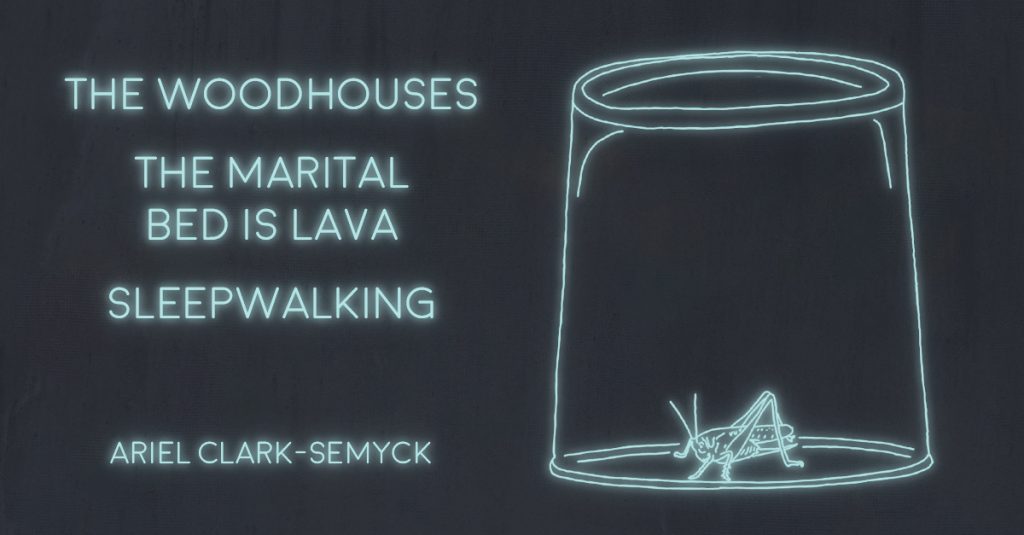
THE WOODHOUSES, THE MARITAL BED IS LAVA, SLEEPWALKING by Ariel Clark-Semyck
the woodhouses
"greensleeves" floats through the halls of the high-rise & stops in for the showing. the new tenants are young & comely. they pay no mind to the plea of the piano or the hospital stretcher rounding the corner. the woman’s blonde hair curls inward at the ends, teasing the tip of her heart-shaped face. the man wears a powder blue linen suit & slaps her ass while the realtor isn’t looking. they each excrete a gasp when they see the living room. they make a show of admiring the antiques, the burgundy drapes. they take a thoughtful glance at the writing desk. i can tell they can’t wait to paint everything white. maybe yellow as an accent color. their first night in the apartment, they peel their clothes off in silence & couple on the bare floor. smoke reaches through the keyhole of the closet & threads its needle through my eye. it’s nice to have company.
the marital bed is lava
i watch the occultists sit down to roast beef & mashed potatoes served on fine china. they swirl their glasses & playfully bicker about the pope. it’s chocolate mousse for dessert. one wife notices the funny undertaste but eats it anyway. smoke trails from the armchairs, through the parlor room, to the kitchen where the women wash dishes in rubber gloves. back in their own bedroom, the husband sits five inches away from a televised boxing match while his wife unhooks her garters & comments on the other couple’s dining habits. her body collapses to the floor & turns into a slinky. he picks her up, an end in each hand. her coils stretch & condense from palm to palm as she whispers baby names in the dark until morning. andy or jenny, andy or jenny, andy or jenny suckle at my heartstrings. romance is feeding each other grapes for twenty years while our voiceovers pop off.
sleepwalking
sadism is not a good replacement for self-fulfillment is the kind of shit she says to herself as she wipes the blade on her hem & exits stage left. the hallway tonight is drenched with thick black air. it gets stuck in her hair. it wears her body like a dress as she paces back and forth, the hands grabbing at one another like two animals in heat. one hand mounts the other hand & rubs & rubs. is watching it die the same thing as taking its life? she caught a cricket under a glass once & waited until morning. she caught herself under a crumbling pedestal & waited for years. this little hand. she takes her hand to her nose & then takes it in her mouth. this little hand. she sucks on the knuckle of her index finger. the air watches this, its appetite sharpened. it sops from her hair down to her face & sucks. she thinks goodbye would be like going to the grocery store & picking up a pound of ground chuck or a gallon of milk. the air turns her head over & over on its tongue. is watching him swim further out to sea the same thing as watching him drown? she thinks goodbye would be like sitting on the shore with the sun in her eyes, like taking a photograph of the sunset so she could look back on it fondly whenever she liked. one hand mounts the other hand. the air has whittled her down to an echo of the sound of him at the end of the hallway. he is grabbing another beer from the fridge.
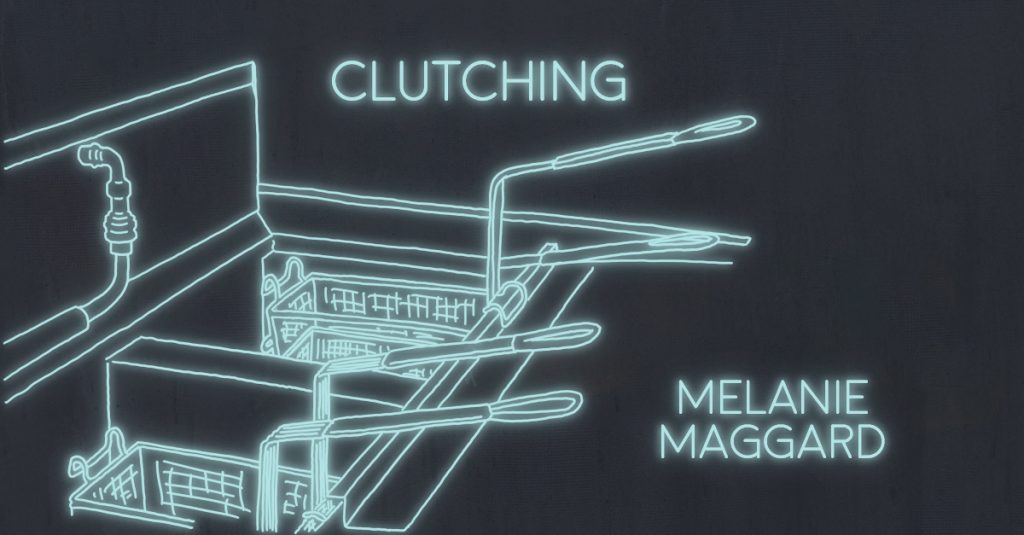
CLUTCHING by Melanie Maggard
Maybe you’re off the highway, cleaning out the deep fryer at a bowling alley in a college town in Virginia, the alleged state for lovers. You’re a boy in jeans and a Fresh Prince t-shirt, a short apron splattered with an eagle rising from a pool of blood. Townies and good ol’ boys order deep-fried chicken wings, burgers, nachos with canned cheese sauce the color of cantaloupes. They heehaw, drunk on Buds and Jim Beam, high on the split they just picked up in the last frame. You cringe with each dropped “g,” but we’re all dying, anyway. You’ve dropped into the gutter of loneliness, after dipping your toe in and realizing it feels just right. Here, now, things make sense, you’ve got orders and tasks. Your manager wants to crawl up your towering body and perch her fat ass on your shoulder like a crow, squawk in your ear while nibbling on crinkle fries. Sometimes while closing, you get lost in the cleaning and think: this could be it, all there is to life, every day an echo reeking of cooked meat and freezer burn. You’re in college, and they tell you the whole world is in front of you, places you will go, things you will see and do. But at 20, with maxed-out credit cards and a grand in engineering textbooks to buy, you keep hunting for the tracks of that dream. Your hands are burlap and chaps from bleach and scalding water. Your head explodes with formulas for lift and drag when all you want to see is space. Some days you sit on the tacky floor of the storage room, cry for the girlfriend studying literature six states away. You wonder if she’ll stay true, if you will. You finger the keys in your pocket and chew on how long it would take you to drive to her. She’s everything you need right now because she sees you as more than who you are today. She’s your best friend and you think of her alone in her apartment, crying while she spoons the pillow you slept on last summer. You breathe deeply and for a moment you smell White Rain strawberry shampoo. The bottom of this hole you’re in is round and smooth, but you devour it, you endure.
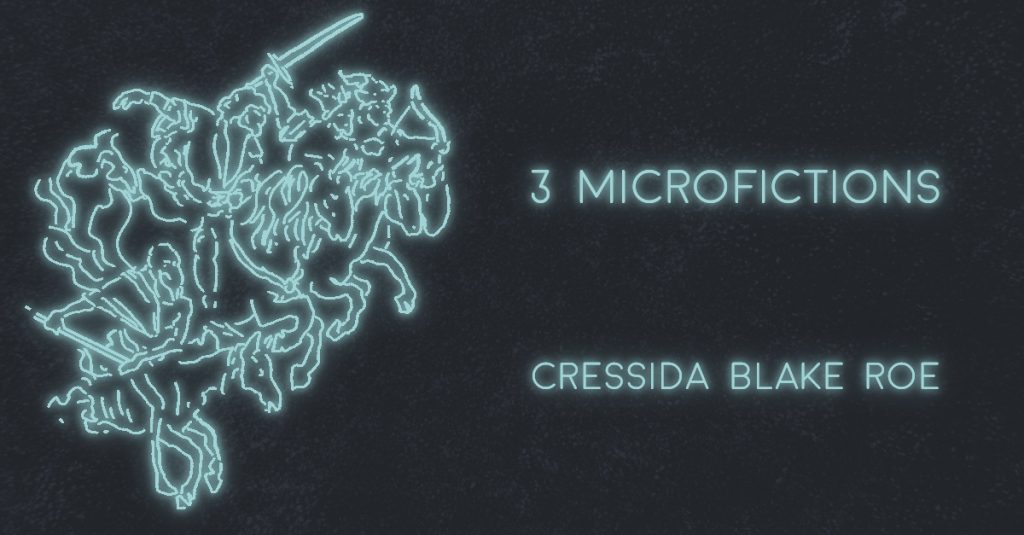
THREE MICRO FICTION PIECES by Cressida Blake Roe
Apocalypse Needs a More Exciting Plural Form
Proposition One:
The plural form of apocalypse isn’t nuclear fallout, environmental degradation, contagions, Horseman, acts of God, or St John’s Revelations. Instead, it sounds more like a woman fleeing in broken counterpoint to the screech of subway brakes and takes the shape of a fist slamming through a wall two inches from a child’s head: finales too small for the tabloid headlines, too colossal for folding away between pages, out of sight.
***
The train didn’t stop in time. They said she didn’t mean to die. Her husband thought, in front-page letters three inches high, that she always seemed perfectly happy. He didn’t know her nightmares, when she drowned in sealed vessels feeling less afraid of the water’s weight than the sharps of the sky. The sky strikes down, opened hand/closed hand. Nobody asked how many times the hand struck before. The child dreams of his father’s eyes staring out from the hollows of gun barrels, and the bullets whiz toward him, too slow for mercy.
Proposition Two:
The plural form of apocalypse is a paradox, implying a multiplicity of ends to worlds that can only end once. Only so many parallel universes can exist. Discarded cataclysms shake hands, murmuring with low voices in the slush pile of the gods. They were not violent, heartrending, pyrotechnic, pretty enough to make the cut. Better luck next time. But only so many worlds demand obliteration.
***
The moon crawled out of the mountain just after midnight, and the first people who had awoken pointed up at the slanted horizon.
“What dread god had arisen?” we asked ourselves. “What power comes to glare down with its cold eye?”
No one has answers. We drown our faces in the pond to drink its milky excrescence and punish the river that shatters its shadow. We open our wrists and drain the blood so that the land runs red and silver, loving this newly minted god the way the rain loves the soil.
Proposition Three:
The plural form of apocalypse invites destruction déjà vu, wearing the mask of innovation: a banality of hatred opening the same chambers and igniting the old fires. Leviathans press at the surface and leer, flooding the womb and crunching the sun in their teeth. In these days that are ending, each forged beginning chokes its hold and calls this gasping silence gratitude.
***
We unhinged our jaws to their fullest extent so that we could devour those who had and those who fed themselves on those who had not. We filled up the gaps in what had burned. If the world insists on forgetting our bodies, shoring up structures of good that would not otherwise remain, then perhaps it will overlook the traces of blood left behind, the bone shards, the tears of children in empty schools and parking lots, the mothers who lost their mothers, those who were no longer able to breathe.
Spooky Action at a Distance
And for now we are, indeed, here: six hours from sunrise.
The wheels rattle on towards tomorrow, and arrival. Until then, we sit in the lamplight glare and reflect on the meaning of terror, white-masked and waiting just behind us, a little out of sight. Perhaps the railroad ties will contradict the past, rushing away in the dark. Once, I asked you for a cigarette, but the smoke, wreathing in new patterns, intercepted the message. Six hours from sunrise, but nothing ever changes. Once, you asked to feel my edges, torn and fibrous from too much handling by those less considerate, used into an illusion of comfort. Have I said how I hate the presumption of nostalgia, wielded by old women? You cannot respond, weeping iron tears that do not fall. Six hours from sunrise, and nothing will ever change. No, you say at last, understanding the futility of this rattling, toward a destination that neither hell nor heaven can declare. Curling memories lie damp all around, rotting with the slow ceremony of forgiveness. I wished I could touch you in return—you, who I address as though such a distinction could alter this journey. But my absent face cannot communicate these desires, and they slip between the lines of light, lost. Terror watches through broken eyes and considers. Outside, in the rattling dark, we are six hours from sunrise.
And for now, we are, indeed here.
A Brief Treatise on the Unreliability of Memory
You taught me to speak of myself in the third-person, as though life were a story that could be rewritten.1 Anonymity lifts the weight of four letters branded across her breasts: SLUT, bullet syllable shot back and forth across her battlefield body and never reaching anywhere,2 when the dismembered diagnosis of language bears no resemblance to the possibility of a cure.3 In the third-person, she wrote a poem.4 In the second-person, you write a letter.5 In the first-person, I am still trying to understand why hope feels like such an indefinable burden to carry.6
1 He seduces her, in one version. In another, tree roots no longer scar the ground & she suffocates on dreams
2 deep in sleep’s ivory box, where her mother tongue suggests how lucky it was that he was such a good guy.
3 Symptoms remain untreatable except by passing apologies in counterfeit coin, love honed on an edge pure enough to cut men away.
4 The poem is a life that never ends. What sounds true only becomes a lie about somebody else
5 addressed to a ghost that refuses to exist in a post-trauma reality. She never learned how not to ask for justification,
6 sexless & obscure, taken from strangers with the same imperfect excuses.
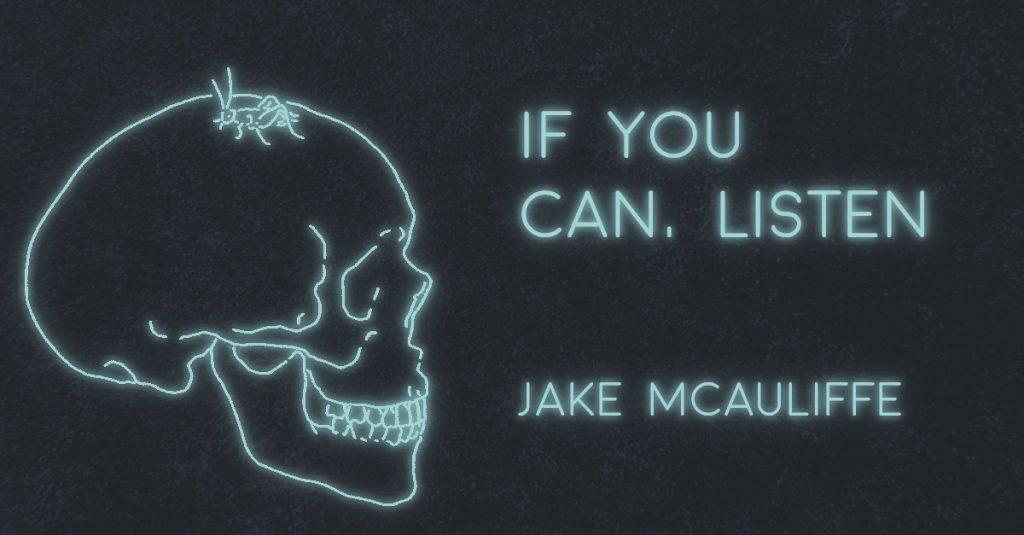
IF YOU CAN, LISTEN by Jake McAuliffe
First off, endings are quiet. As something/somelove dies, a spacetime wound will appear to you and crickets will come out. They will flood your ears and tickle your canals like cotton. Some cheeky crickety fucks are going to use your body as a musical instrument. This is normal. I think every bone and pipe inside the human body was placed on purpose. You may have heard the theory of “intelligent design” but try this: crickets frisking your insides for anything that can shake the air. That’s music, baby. And that’s how tinnitus comes about. It’s insects. It’s our slow air for death, the one which we alone cannot play. I heard it only yesterday. In the worst white room, my love pinched my palm pink before her last breath smashed the air flat. Then, C sharp.
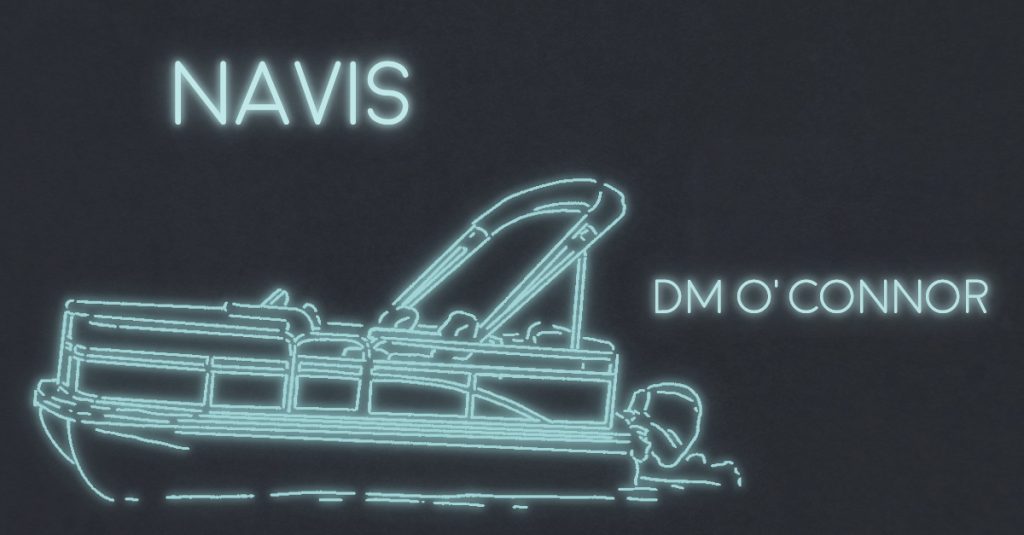
NAVIS by DM O’Connor
Tricky Dicky Manure, my first boss, said the raccoons on Lake Huron were dexterous enough to pick bicycle locks with their fingernails. He paid three fifteen an hour. His desk sat in the corner of a steel Quonset ex-military hangar which could hold every boat in the harbour in winter and only the coolest air in summer. Atop the desk: a hammer and a dictionary. Tricky Dicky liked shade, hated sweat.
My interview was to fill the diesel mower without spilling a drop. One drop and you’re gone. Raccoon nails can cut a flap in a screen easier than a razor then open a fridge and shotgun a six-pack before you hear a floorboard creak. They shit and make love on the roof, occasionally simultaneously.
Dicky weighed a ton and wore a skipper’s hat. I got to keep and return all the empties I could find on the docks and riverbank. After a sunny long weekend, the deposit on the bottles and cans would surpass twenty dollars. New Dicky words: groin, dredge, ketch, bowline, teak, epoxy, latex. After drydocking the vessels, the season’s finale, I’d stain, varnish and winterise everything the tractor couldn’t load into the hangar. Dicky would drive off to Tampa Bay and I’d go back to school.
Kelly’s Boogie Parlour’s staff docked a barely-buoyant houseboat in Tricky Dicky Manure’s Marina. Boy, did they leave a load of empties. Often bikini bottoms drip-dried over the dead soldiers. People passed out everywhere. On Labour Day, Dicky sent me to collect the arrear dock fee which gave them a real kick. You want our rears? They showed me full moons. Hosed me up and down. Cannonballed into slime.
The boat finally sank that night and the staff skedaddled. I had to submerge into the algae and tie the winch cable under the back pontoon axle brace. Dicky towed her halfway up the bank, told me to douse her in diesel, which I did with pleasure before he tossed his lit Romeo y Julieta into the scuttled pontoon.
Through the anticipatory silence before the flames took, I asked Dicky why vessels were always referred to in the feminine. The blaze grew, as did the red of his neckless face: I could tell you some inane jokes, paint and powder, metaphorical replication of a mother’s womb, she keeps you dry and warm, a place to sleep, maintenance costs, deep respect, blame Latin. All trite truisms. Next summer, you should find a better job. You’re worth more than I say.
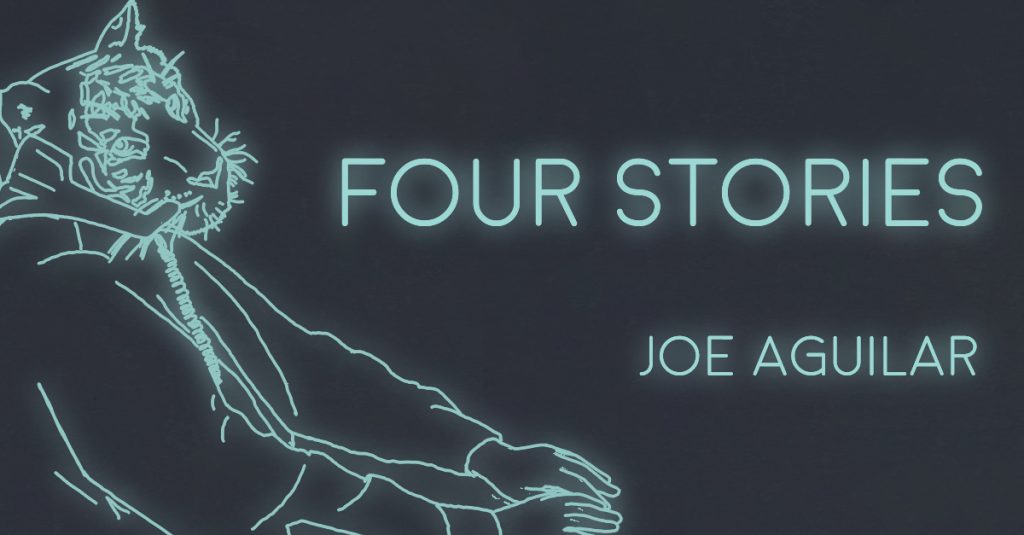
FOUR STORIES by Joe Aguilar
Face Tattoo
I get a tattoo of my face over my face. Now my face looks even more like my face. It’s my face twice over. My wife asks me if I’m in a good mood because today I look brighter than ever. I tell her yes. It’s true. I’m true. My truest face.
The Man with the Tiger’s Head Who Answers Phones
I have a human body and a tiger’s head. People stare at me on the train. I avoid their eyes. I answer phones at the company that makes weapons. Nobody sees me over the phone. My voice is deep and splendid like a purr. I sleep very deeply. In the dream I run through a jungle. The trees are on fire. Somebody’s screaming.
Night Meat
- In the cabin we eat meat for nourishment.
- Chad leaves to look for more meat. Where is Chad?
- Vlad goes to look for Chad. Where are Vlad and Chad?
- We are hungry enough to lock the doors. Tad and I knock on Brad’s door. Poor dead Brad!
- I wander the woods full of nourishment. The moon tracks me like an eye.
The End of the World
I am out for my morning run when I see the mushroom cloud blossoming over the skyscrapers. Then I hear the explosion and am knocked to my hands and knees. The air smells sweet like ozone. A car alarm is going off. The end is near. I run into a gas station. A microwave beeps. The cashier has hung himself with a red licorice rope. A hotdog turns behind glass. It starts to rain.
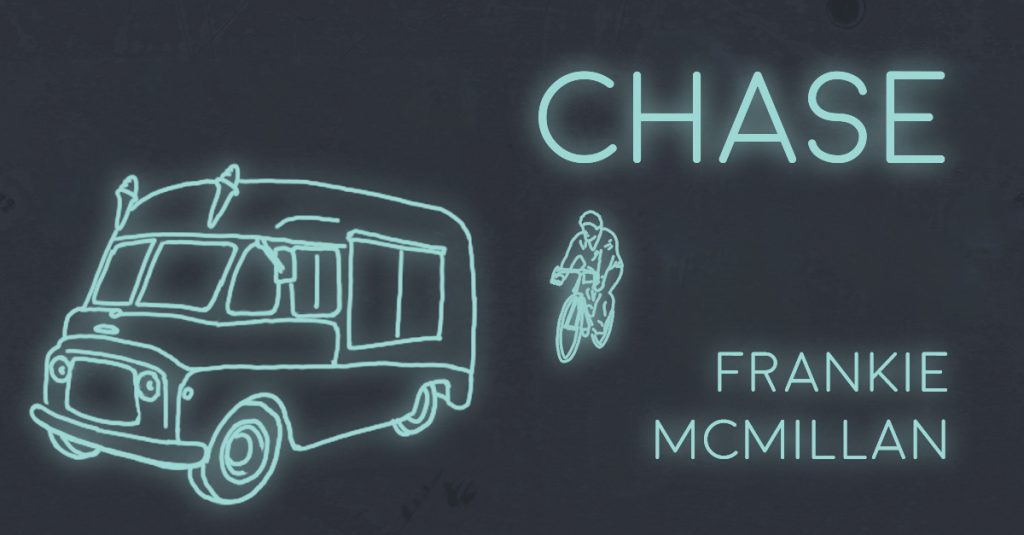
CHASE by Frankie McMillan
Mr Whippy here and there, up the street, down the street, swerving his pink and cream van to avoid a dog, Mr Whippy his face emperor white, hunched over the wheel wondering what dogs want with Mr Whippy.
Mr Whippy glancing in the rear vision mirror, kids still chasing him on bikes, their heads ducked under the handlebars, a mother jogging with a baby on her hip, ice cream, ice cream but Mr Whippy is wrecked, days leaning out his window, handing out cones with the perfect pointy top, pulling on levers, eyes squinting in the bright sun. his ears ringing.
Mr Whippy turning off his ice cream shaped speakers because Green Sleeves isn’t what he wants to hear right now. He turns into a leafy suburb, checks in the mirror again, sighs with relief. Mr Whippy parks under a tree, eases himself into the back of the van, pours sacks of skim milk into the machine, fondly pats the metal side, re stocks cones, wipes the sticky window sill, tugs on his ear again.
Mrs Whippy shining a torch down his ear canal, slush in his ear she laughs, a cul de sac of sprinkles and Mr Whippy, tired though he is clamps a pale hand on her thigh. Mrs Whippy wriggles loose. Mr Whippy rises.
Out the bedroom door, down the hall, out into the night. Mrs Whippy runs smooth and light as a girl and Mr Whippy follows, his legs pumping, dogs barking, the whole street cheering him on.
